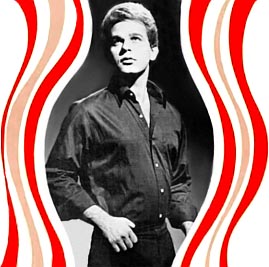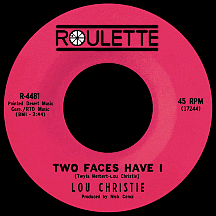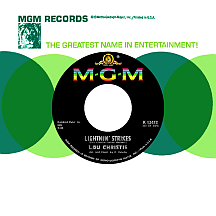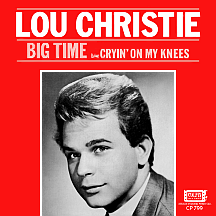LOU CHRISTIE
On a fateful day in 1957, 14-year-old singing hopeful Lugee Sacco met 36-year-old Twyla Herbert and there was magic in the air. The mystical kind. Lugee and his sister Amy Sacco had formed a vocal group they called The Crewnecks in their home town, Glenwillard, just outside Pittsburgh, Pennsylvania. They found out about an audition at a local church, not a management company or record label kind of audition, just a meeting in the basement with this wild-looking-but-attractive red haired woman originally from Riverside, California who had studied to be a classical pianist before switching to writing pop songs. A self-professed "gypsy fortuneteller," she predicted Lugee would be successful in music. And he was hooked. And she was right!
Glenwillard, located in a rural area just outside Pittsburgh to the northwest, was isolated enough to offer a quiet, family-oriented life for dad, mom and six kids (he was the second) from Italian and Polish backgrounds. He attended Moon Township High School (which served several communities in the area north of the 'Burg), its name fitting in with Twyla's penchant for analyzing the moon and stars. Lugee studied classical music, directed the school's chorus and developed an unusual baritone singing style with what became an often-used high falsetto. He and Twyla began writing songs regularly during this time, creating complex, descriptive stories in verses using psychic themes related to nature, weather and the afterlife, as well as ancient civilizations...just for the fun of it, of course
His first recording was a Herbert original, "Close Your Eyes," an uptempo group effort credited to The Classics, issued in 1960 on Starr, a small Pittsburgh label. The existence of other Classics groups necessitated a new name; Sacco fronted Lugee and the Lions, a two-guy (Lugee and Bill Fabec), two-girl (sis Amy and Kay Chick) group that supplied backing vocals on "Ronnie" by Marcy Joe (born Marcy Rae Sockel), a Pittsurgh native recording for local label Robbee, which was a top ten hit in more than a dozen cities and a minor charting single on Billboard in the spring of '61. Then the group had their own Robbee release, "The Trial" ('...I'm guilty of love'), another Twyla-penned tune; Lugee's doo wop falsetto was perfect for the genre, though even with a vocal group revival going strong in '61, the single didn't happen.
There was no shortage of record labels in the Steel City. Lou took a few demo tapes to Nick Cenci, who'd had a popular late night radio show on WCAE 1250 AM until the station flipped formats and call letters in the spring of 1961. "The Gypsy Cried," credited to Herbert-Sacco and based on Twyla's interest in clairvoyance, was recorded with Cenci producing a few musicians and a new trio of backing singers. Out came an effective baritone/falsetto performance based on the "Sherry" sound that had put The 4 Seasons at the top of the charts weeks before, though it was primitive in comparison. Not necessarily a bad thing. New York-born, Los Angeles-based music manager Herb Cohen funded Cenci in the founding of C&C Records. Nick, not wild about the marketability of the name Lugee Sacco, changed it to Lou Christie...without asking!
"The Gypsy Cried" took off immediately in Pittsburgh, hitting number one on KQV 1410 at the beginning of December '62. Sacco would have preferred to keep going with his own name (he liked the idea of being known simply as "Lugee"). But the record was too hot. He couldn't go back. Christie it would be. Cenci made a deal for national distribution with Roulette Records honcho Morris Levy, who got it rolling in N.Y. and watched it spread from there over the first few months of 1963. This was all it took for Lou to gain a legion of fans. The young, female type. They came to his shows screaming, chasing him and trying to tear his clothes off...in other words, the same routine most 19-year-old teen idols had gone through. The next Twyla-Lou song was even bigger; "Two Faces Have I" ('...one to laugh and one to cry') contained mostly-falsetto vocals ('a-yi-yi-yi-yi-yi-yi-hi-hi-hi-hi-hi...') set to a ska-inspired beat. In May of '63 the single went top ten nationally, followed by the similarly-conceived "How Many Teardrops" (first stereo single), top 50 in August. The partnership between Twyla Herbert and the recently-christened Lou Christie had been proven marketable and was destined to continue through fast times and slow times.
That previously-mentioned trio of backing singers were sisters Cathy Owens and Gretchen Owens of Oil City, a small town about two hundred miles north of Pittsburgh, and their friend Linda Jones of nearby Venus, Pennsylvania. Lou exercised his recently-acquired clout and got them a limited contract with United Artists Records. As The Tammys, they sang "Take Back Your Ring," a typical teen ballad (composed by Twyla and Lou), which broke in Erie, Pennsylvania and made its best showing in August '63 in the top ten at WORC in Worcester, Massachusetts. The next single, on the other hand, didn't do as well...though it became a cult favorite years later. "Egyptian Shumba" addressed the mystic aspects of life on the Nile two thousand years earlier. An ancient dance? Did Twyla see this in a dream? Lyrics like 'Way down in Egyptland, the mummies took our hand...' coupled with 'eee-ooo' shouts and screams, made this one of the wildest of all girl group records. Ever.
In the summer of '64, Lou made a move to Colpix Records (a division of Columbia Pictures and a label well-known for its teen idol stars, such as James Darren, Shelley Fabares and Paul Petersen). He took more control producing with Wes Farrell under the Weslu Productions banner; "Guitars and Bongos," a celebration of dancin' and romancin' by the shore, barely registered in airplay or sales, yet it was as good as it got over four singles for the label. He jumped on board Dick Clark's Caravan of Stars Winter Tour, though its dates were all set for the fall, in November and early December. It was a strong lineup, including headliner Johnny Tillotson, along with the tour's hottest draw, chart-toppers The Supremes, alongside The Drifters, Brian Hyland, Bobby Freeman, The Crystals, Dee Dee Sharp and a half dozen other hitmakers. A three week excursion in a couple of cramped buses wound through Ohio, Kentucky, Indiana, Tennessee, West Virginia, Virginia and North Carolina including a November 25 Pittsburgh show with Chuck Berry at the top of the bill. Christie left the tour after the December 4 show to begin Army duty the following day.
While he was serving his mandatory three-month Reserves training, the Tammys had a third and final single on UA, "Hold Back the Light of Dawn." They resumed their studio session duties when he returned. Bob Marcucci, the owner of Chancellor Records and manager of gossip columnist Rona Barrett (he was instrumental in her jump from print to television), took over Lou's management and insisted he move to Los Angeles, a far cry from the farm environment he'd grown up in. He was signed to MGM Records and kept writing songs with Twyla, then went to New York to work with producer-arranger Charles Calello, one of the masterminds behind the "sound" of The 4 Seasons. "Lightnin' Strikes," structured in three tiers with a loose-fingered fuzz box guitar solo by Ralph Casale, was one of several dynamic recordings (on par with Calello's 4 Seasons output) to come out of this session. In November '65 the track broke on WJET in Erie, where he'd performed twelve months earlier. Within a few weeks, Marcucci got it on the air on L.A.'s triumvirate of Top 40 stations (KFWB, KRLA and KHJ). In the second week of February 1966, coinciding with Lou's 23rd birthday, it was America's number one song.
The record labels with Christie songs in their vaults immediately began issuing singles. "Outside the Gates of Heaven" (recorded more than three years earlier for C&C) appeared on Cohen and Cenci's renamed Co & Ce label and had mid-chart success. A Colpix disc, "Big Time," also saw some action. March of '66 was Christie's peak, with three songs on the national charts. MGM's official follow-up, "Rhapsody in the Rain," set to the key passage from Pyotor Tchaikovsky's 1880 classic Romeo and Juliet, contained lyrics some radio programmers considered sexually explicit: 'We were makin' love in the rain...and in this car our love went much too far...and then a flash from above (lightning! lightning!) ...just like our love, it was exciting!' The song met with reluctance that hampered its airplay. A quickly-altered second version made slight changes in the lyrics: 'We were makin' out in the rain' and not much else. It reached the top 20 in April of '66. Around this time, a longtime friendship with singer Timi Yuro turned romantic and they got engaged, but the relationship burned out within a few months. Wedding plans for August were discarded.

"If My Car Could Only Talk," produced by Jack Nitzsche (but written by the Twyla-Lou team!) came across as a "Rhapsody" sequel of sorts, revealing the backseat girl's name: Sarah Jane. The song had a noticeably different sound from his other releases. Lou signed with the big label, Columbia, in 1967 with Calello again producing, though only the first single hit the charts. Columbia had a video produced for "Shake Hands and Walk Away Crying," but it barely registered. Three more unsuccessful 45s and he was off Columbia. Hits were getting harder to come by! A four year stint with Buddah Records placed him with hook-specialist (and frequent bubblegum) songwriter Tony Romeo and resulted in a top ten hit, "I'm Gonna Make You Mine," in the fall of 1969. Follow-Up "Are You Getting Any Sunshine," the first to credit "Lou Christie-Twyla" as songwriters, didn't do much, but its 1970 follow-up "She Sold Me Magic" hit the U.K.'s top 30 was successful in several other countries.
While spending some time in London, Lou emerged clean from a drug habit he'd developed, then met U.K. beauty pageant contestant Francesca Winfield and married her in 1971. His Buddha run ended in '72 and he was signed to New York's Three Brothers label, where he continued working with Tony Romeo. Recordings with writer credit to Lou Christie-Twyla continued, despite a failure to connect with anything post-1970. Was it Twyla's crystal ball, perhaps, that told her to do it this way? Or her horoscope indicated some kind of identity switch? Perhaps she should have asked the opinion of a certain Ms. Warwicke as to the wisdom of such a move.
Lou's biggest hit of the 1970s came in the early months of '74. "Beyond the Blue Horizon" was first performed by Jeanette MacDonald in the 1930 musical film Monte Carlo, an early "talkie." Lou's atmospheric, country-leaning rendition reached a solid number 12 peak on the Easy Listening charts. Later in the 1970s, tired of the constant promotional wrangling he'd always gone through in the music industry, he decided to become a "regular guy," working under his given name as a truck driver, for a carnival and as an offshore oil driller. He made a couple of singles for Midland International during this time, including a "disco Wilson Pickett" take on "Don't Knock My Love" with duet partner Pia Zadora. Recording a number of commercial jingles added to his his versatile resumé. Performing on the oldies circuit in the '80s, he crossed paths with Lesley Gore and for fun they did some onstage duets; positive response from audiences resulted in a remake of one of his earlier recordings as part of a medley ("Since I Don't Have You / It's Only Make Believe / Our Love Was Meant To Be") for Manhattan Records in 1986.
Since the 1990s, Lou Christie has continued performing, but mostly stays home enjoying his "regular" life with wife Francesca. His five-decade friendship and working relationship with Twyla Herbert (they composed hundreds of songs together) continued right up until her death in 2009 at age 87.
NOTABLE SINGLES:
- Close Your Eyes - 1960
- The Jury - 1961
as Lugee and the Lions - The Gypsy Cried - 1963
- Two Faces Have I - 1963
- How Many Teardrops - 1963
- Shy Boy - 1963
- Guitars and Bongos - 1964
- Have I Sinned - 1964
- Lightnin' Strikes - 1966
- Outside the Gates of Heaven - 1966
- Big Time - 1966
- Rhapsody in the Rain /
Trapeze - 1966 - Painter - 1966
- If My Car Could Only Talk - 1966
- Since I Don't Have You - 1966
- Shake Hands and Walk Away Cryin' - 1967
- Canterbury Road - 1968
as Lou Christy - I'm Gonna Make You Mine - 1969
- Are You Getting Any Sunshine? - 1969
- She Sold Me Magic - 1970
- Indian Lady - 1970
- Beyond the Blue Horizon - 1974
- Riding in My Van - 1976
- Spanish Wine - 1977
- Don't Knock My Love - 1980
by Pia Zadora and Lou Christie - Since I Don't Have You / It's Only Make Believe / Our Love
Was Meant To Be - 1986
by Lesley Gore / Lou Christie




